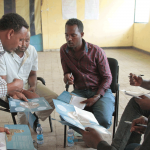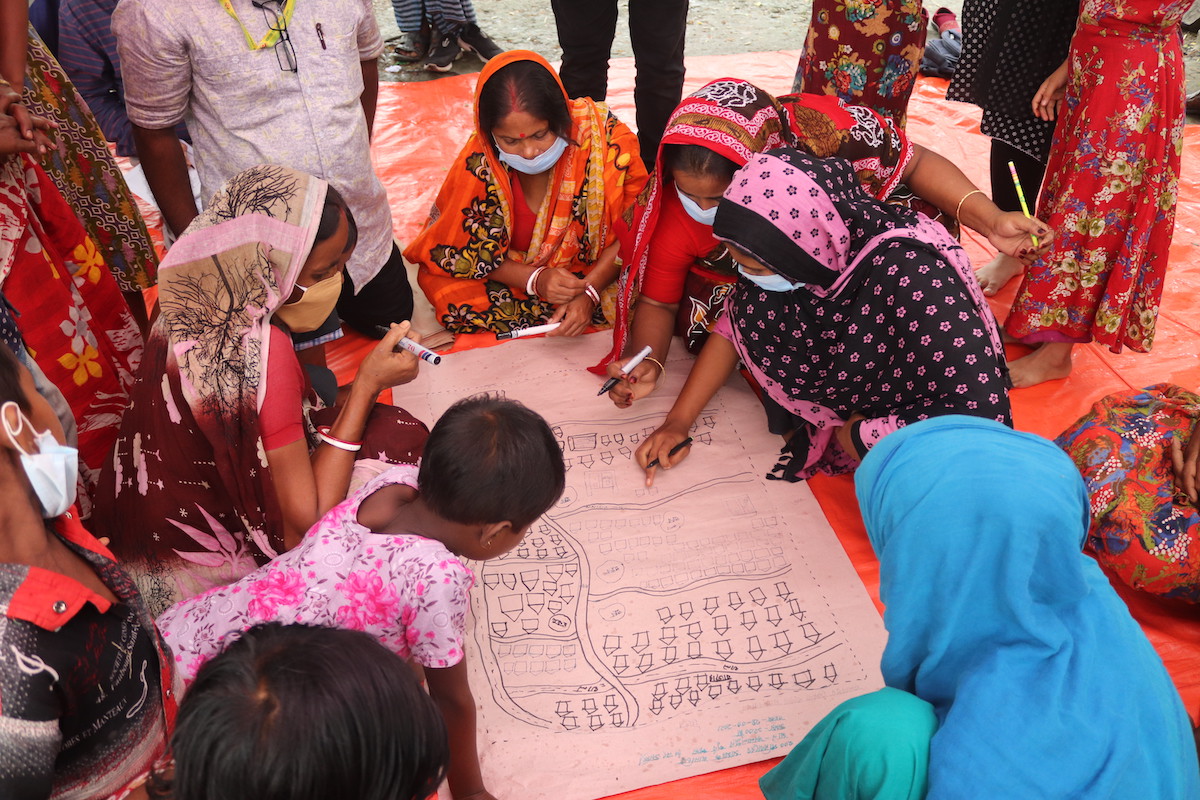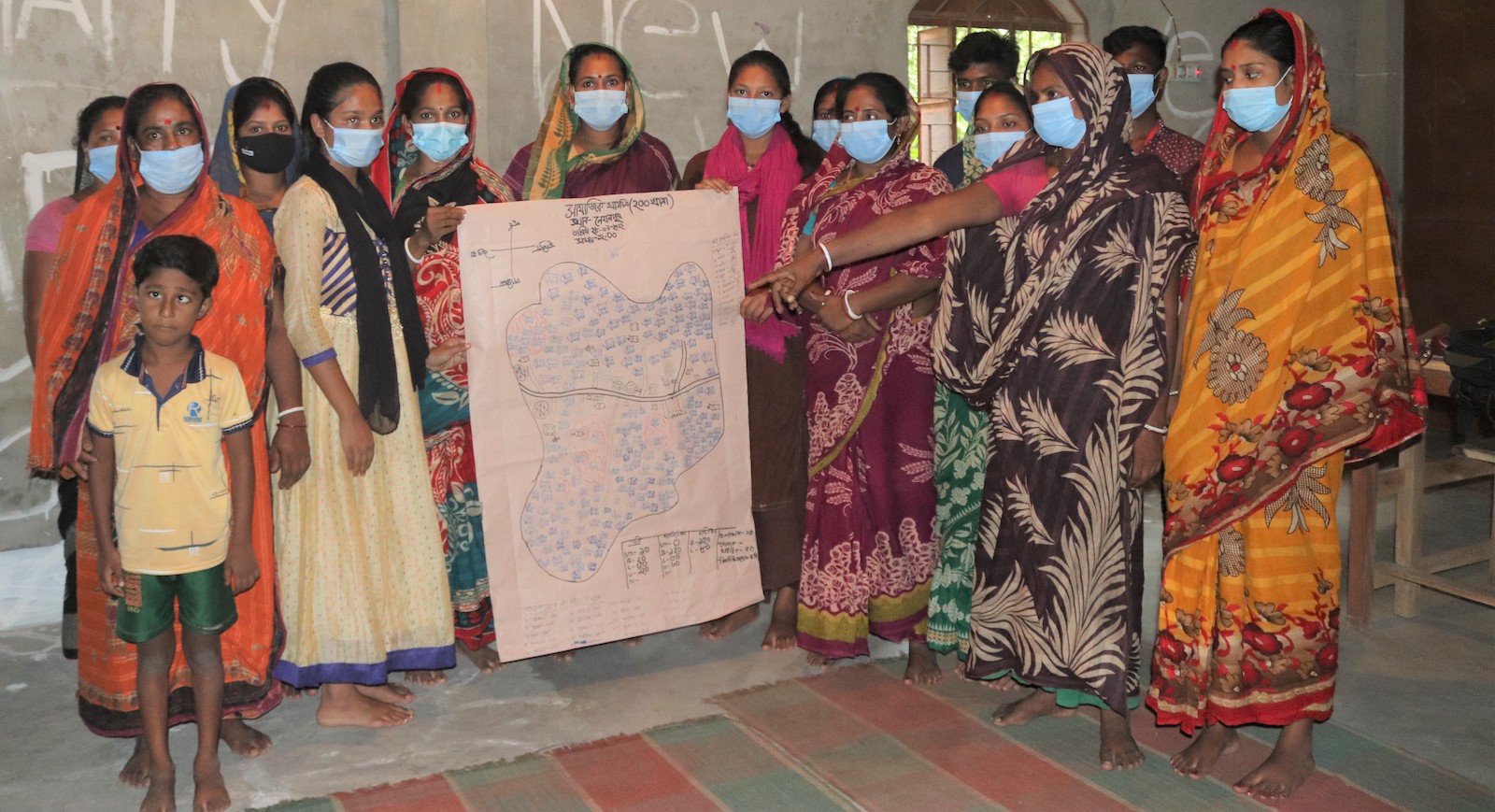

Community monitoring tools are ways for community members to keep track of and collect evidence on the status of their access to water and sanitation at community level. The community is very involved in the monitoring. Often, a civil society organisation facilitates the process, but government should at least be involved. There are different strategies to collect evidence. For example community mapping, questionnaires, collection of visual evidence, among other things. The aim is always to collect evidence, which is then most often used in advocacy.
Through the contribution of the communities in mapping and monitoring the WASH status, local government officials track who are those most in need and assess water and sanitation services and facilities. They can use human rights criteria of availability, accessibility, affordability, acceptability and safety/quality.
In addition, the monitoring process itself can be fully aligned with human rights principles such as non-discrimination and active participation of all community members present during the mapping. Looking at all these aspects and discussing them with the community during the mapping process helps to identify gaps in progress towards realisation of the rights to water and sanitation. This can be used in advocacy.
Typically, the role of the community is to gather water and sanitation data through social mapping in order to understand how to best address their needs. Civil society organisations and ideally local government usually facilitate this process. The organisations ensure community participation, especially of people who are more likely to be excluded. And they use the data for advocacy. They also facilitate the process of raising voices and demands directly from the community to the local government institutions.
The role of the government is to accept, adapt and use monitoring in other communities too, to gain an overall understanding of the WASH status in their areas. They should then deliver services to address the needs identified through monitoring – following human rights principles. Ideally, in time, local government institutions will have sufficient human resources to conduct such community monitoring process on its own, with civil society only involved to ensure adequate and representative community participation, so no one is left behind.
While most tools cover human rights criteria and principles to some extent, they tend to miss some. There are a few reasons:
1. Providing water and sanitation services or facilities by the local government institutions itself is seen as huge contribution, given limited budgets and human resources.
2. Quantity is often seen as more important than the quality of services/facilities. Thus, questions regarding operation and maintenance and sustainability remain.
For example, advocacy for new pipeline connections, tube wells, public toilets is common, but most do not ask about the condition of existing facilities or monitor operation and maintenance. When monitoring tools and processes do not fully capture all the principles and criteria of the human rights, there are gaps in the evidence. Progress on– for example – accessibility can then seem larger than it is: In reality, this access is not sustainable and therefore is likely to regress in a few years.
For organisations doing community monitoring, it’s important to be clear on such gaps and to not claim human rights based monitoring when not all criteria and principles are covered.

It is important that not only the advocacy initiatives, but also monitoring data collected is aligned with human rights principles. During social mapping, the right questions should be asked so that data is generated in line with human rights principles and criteria.
For example, if a tube well is provided for the marginalised groups, there needs to be a question whether the water quality is being tested regularly by the local government institutions or not. And whether all intended users can in fact safely access it and use it. And whether the tariff is affordable for the target group or not.
Moreover, on the organisation of monitoring processes: Particular attention is currently paid to the people represented in these mappings, and their participation in the process. Civil society plays a strong role there and needs to apply the non-discrimination principle consistently. Other principles, like sustainability, have often less attention in such tools. It is important that all principles are taken into consideration by the institutions organising community monitoring.
Monitoring processes do not yield immediate results and this can be frustrating for people involved. The process is also not stand-alone. It requires coordination, collaboration and leadership from local and national level government to act on monitoring data and realise the rights to water and sanitation. This requires advocacy to ensure government institutions follow human rights principles when delivering WASH services for all.
It is important to be open with community members about the different processes and what they involve. People need to know what to expect. Important though; in our experience in Bangladesh, consistent monitoring, raising evidence driven demands from grassroots level and collaboration with local government institutions can foster the process of realising the human rights to water and sanitation fully.
More information on protest: https://www.r2k.org.za/protestguide/ https://protestguide.org.za/
More information on litigation: https://www.pils.org.za/ https://www.southernafricalitigationcentre.org/ https://www.icj.org/
EWP claim your water rights: https://www.endwaterpoverty.org/Claim-Your-Water-Rights-FAQ
Fighting for water in South Africa: Public participation, water rights claiming and strengthening governance – Thato Masiangoako (Thato@seri-sa.org), Kelebogile Khunou (Kelebogile@seri-sa.org) and Alana Potter (AlanaPotter@endwaterpoverty.org), Unpublished article for H20 Open Journal, IWA, November 2021.
Publisher: WASH United gGmbH
Fuerbringerstrasse 7 | 10961 Berlin | Germany
Telephone: +49 (0)30 555 768 060
Email: info@wash-united.org